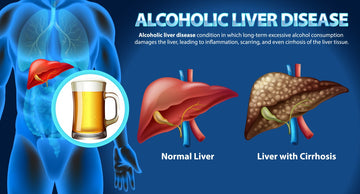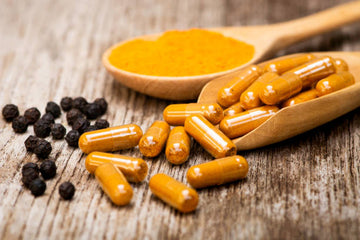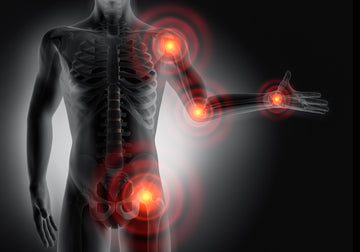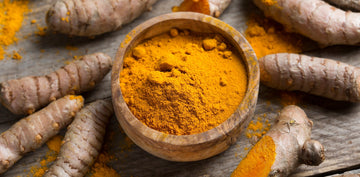Many people enjoy a drink without knowing what alcohol does to your liver. Every year, millions of North Americans develop alcohol and liver disease, yet most don't realize there's a problem until serious damage occurs.
Think of your liver as your body's main filtering system – it processes everything you consume, including alcohol. But just like a coffee filter that gets clogged over time, your liver can become strained when it has to handle too much alcohol.
Understanding how alcohol affects the liver isn't just medical trivia – it's essential knowledge for anyone who drinks. When alcohol enters your body, your liver works overtime to break it down and protect you from harmful effects. This constant stress can lead to various alcohol liver problems, from mild inflammation to severe organ damage.
The good news? Most alcohol-related liver damage can be prevented or even reversed if caught early. As we explore the different ways alcohol can affect your liver health, you'll discover exactly what happens inside your body when you drink and how to recognize the warning signs of liver trouble.
Types of alcohol-related liver disease
1. Alcoholic fatty liver disease (early stage)
When alcohol consumption first starts affecting your liver, fat begins to build up in the liver cells. This is called alcoholic fatty liver disease, the earliest form of liver damage. Think of it like a car's engine getting clogged with dirty oil.
The good news is that this stage is completely reversible if you stop drinking. Many people with fatty liver disease don't feel any symptoms, which is why regular medical check-ups are important if you drink regularly.
2. Alcoholic hepatitis (middle stage)
If drinking continues, the liver can become inflamed, leading to alcoholic hepatitis. This condition can develop suddenly or build up slowly over time. Unlike viral hepatitis, this type is directly caused by alcohol use.
Your liver becomes swollen and damaged, potentially causing symptoms like yellowing skin, fever, and abdominal pain. While mild cases can be reversed by stopping alcohol use, severe alcoholic hepatitis can be life-threatening.
3. Cirrhosis (advanced stage)
The most serious form is cirrhosis of the liver from alcohol. At this stage, healthy liver tissue is replaced by permanent scar tissue. Picture a smooth, healthy liver becoming hard and lumpy, like a rocky surface.
This scarring prevents your liver from doing its job properly. While cirrhosis itself can't be reversed, stopping alcohol use can prevent further damage and help you live longer. About 10-20% of heavy drinkers develop cirrhosis.
4. End-stage alcoholic liver disease
In its final stage, alcoholic liver disease can lead to complete liver failure. At this point, the liver can no longer perform its vital functions. This is a critical condition that may require a liver transplant.
However, transplants are only considered for patients who have completely stopped drinking alcohol and maintained sobriety for a significant period.
Understanding how alcohol affects your liver
Your liver is like your body's cleaning crew, working 24/7 to filter toxins, process nutrients, and keep you healthy. It's about the size of a football and can normally handle small amounts of alcohol.
However, each time you drink, your liver has to stop its other important jobs to focus on removing alcohol from your blood.
What happens when you drink?
When alcohol enters your system, your liver immediately starts breaking it down into less harmful substances. Think of it like a recycling plant that has to sort through toxic materials.
Your liver can typically process about one standard drink per hour. Anything more than that causes the excess alcohol to circulate in your bloodstream while your liver struggles to catch up.
A single night of heavy drinking can make your liver work overtime, causing temporary fatty buildup. While your liver can usually recover from this, regular heavy drinking is like constantly overworking an engine – eventually, parts start to wear down and break. Over time, this stress can lead to inflammation, scarring, and permanent damage.
Different people process alcohol differently. Your risk of liver damage depends on:
-
How much you drink
-
How often you drink
-
Your gender (women are more sensitive to alcohol's effects)
-
Your overall health
-
Your genetics
-
Whether you eat while drinking
The tricky part is that your liver won't complain right away – it can handle a lot of abuse before showing signs of damage. That's why many people don't realize there's a problem until their liver is seriously hurt.
Understanding safe limits
For most adults, moderate drinking means:
-
Women: Up to 1 drink per day
-
Men: Up to 2 drinks per day
But even these amounts might be too much for some people. The safest approach is to talk with your doctor about your personal risk factors and drinking habits.
14 signs of liver damage from alcohol
1. Frequent fatigue and weakness
Your body has to work harder when your liver isn't functioning well, making you feel tired more often than usual. This isn't just normal tiredness – it's a deep exhaustion that rest doesn't seem to fix.
2. Unexplained weight changes
Your liver helps process everything you eat and drink. When it's damaged, you might lose weight without trying or gain weight in unusual places, especially around your abdomen.
3. Stomach issues
Nausea that comes and goes
-
Loss of appetite
-
Stomach pain, especially in the upper right side
-
Bloating that wasn't there before
4. Changes in bathroom habits
Look out for:
-
Darker urine than usual
-
Pale or clay-colored stools
-
Frequent upset stomach
5. Yellowing skin or eyes (jaundice)
This is a clear sign your liver isn't filtering properly. The yellow color comes from bile that your liver normally processes.
6. swelling
-
Puffy ankles and feet
-
Swollen belly
-
Bloated face or hands
7. Skin changes
-
Itchy skin that won't go away
-
Easy bruising or bleeding
-
Spider-like blood vessels visible on the skin
-
Redness on palms
8. Mental changes
-
Confusion or foggy thinking
-
Trouble concentrating
-
Memory problems
-
Change in sleep patterns
9. Physical discomfort
-
Ongoing right-side abdominal pain
-
Tender or swollen liver area
-
Muscle cramps
10. Digestive issues
-
Frequent indigestion
-
Acid reflux that won't go away
-
Vomiting, especially with blood
11. Severe confusion
Sudden mental changes or extreme confusion need immediate medical attention.
12. Bleeding problems
-
Nosebleeds that won't stop
-
Bleeding gums
-
Blood in vomit or stool
13. Extreme fatigue
Being so tired you can barely function or stay awake.
14. Fever with other symptoms
Especially if accompanied by shaking, severe pain, or yellowing skin.
Important note:
-
Don't wait to see multiple signs before getting help
-
Early treatment gives you the best chance of recovery
-
Many of these symptoms can be reversed if caught early
-
Regular check-ups are crucial if you drink alcohol regularly
Diagnosis and detection of alcohol-related liver disease
When to see a doctor?
Don't wait for multiple symptoms to appear before seeking help. Schedule a check-up if you:
-
Drink alcohol regularly and notice any unusual symptoms
-
Have a history of heavy drinking, even without symptoms
-
Experience unexplained fatigue, nausea, or abdominal pain
-
Notice yellowing of your skin or eyes
-
Have swelling in your legs or abdomen
Common diagnostic tests
1. Blood tests
-
Liver function tests (LFTs): Measures enzymes that show how well your liver is working
-
Complete blood count (CBC): Checks for anemia or infection
-
Clotting tests: Shows if your liver can make proteins for blood clotting
2. Imaging tests
-
Ultrasound: Uses sound waves to create pictures of your liver
-
CT scan: Provides detailed images to check liver size and look for damage
-
MRI: Shows detailed liver structure and can detect scarring
-
FibroScan: Measures liver stiffness to check for scarring
3. Physical examination
Your doctor will:
-
Feel your abdomen to check liver size and tenderness
-
Look for visible signs like jaundice or spider veins
-
Check for swelling in your legs and abdomen
-
Test your mental alertness
Treatment and recovery options
Immediate steps
-
Stop drinking alcohol completely
-
Get medical supervision if you drink heavily (withdrawal can be dangerous)
-
Start regular medical check-ups
-
Begin prescribed medications as directed by your doctor
Medical treatments
1. Early stage treatment
-
Nutritional support and vitamins
-
Medications to reduce inflammation
-
Treatment for other health conditions
-
Regular liver function monitoring
2. Advanced stage care
-
Management of complications
-
Medications for:
-
Reducing fluid buildup
-
Preventing bleeding
-
Controlling blood pressure in liver vessels
-
Fighting infections
-
Hospital care when needed
3. Critical care options
-
Liver transplant evaluation if necessary
-
Emergency treatments for complications
-
Intensive monitoring
-
Specialized medical support
Recovery process
Lifestyle changes
-
Complete alcohol abstinence
-
Healthy, balanced diet
-
Regular exercise as approved by your doctor
-
Adequate rest and stress management
-
Regular medical follow-up
Nutrition plan
-
Low-sodium diet if you have fluid retention
-
High-protein diet (if approved by your doctor)
-
Plenty of fresh fruits and vegetables
-
Avoid processed foods
-
Stay well-hydrated with water
Support systems
-
Join alcohol recovery groups
-
Attend liver disease support groups
-
Consider counseling or therapy
-
Build a network of supportive friends and family
-
Connect with others in recovery
Natural support options
-
Doctor-approved supplements
-
Gentle exercise like walking or yoga
-
Stress reduction techniques
-
Adequate sleep
-
Consider complementary therapies like:
-
Acupuncture
-
Meditation
-
OurJrney's Nano Turmeric for liver support
-
Natural ingredients
-
Easy-to-mix powder packets
-
Supports organ health
Signs of healing
-
Improved energy levels
-
Better appetite
-
Reduced swelling
-
Improved blood test results
-
Better mental clarity
Recovery is possible with proper treatment and lifestyle changes, especially if liver damage is caught early. Each person's recovery journey is unique, and it's important to work closely with your healthcare team to develop the right treatment plan for you.
Natural support for liver health
Beneficial foods for liver health
-
Dark leafy greens (spinach, kale, collards)
-
Cruciferous vegetables (broccoli, cauliflower, brussels sprouts)
-
Garlic and onions
-
Citrus fruits (lemons, limes, oranges)
-
Berries (blueberries, strawberries, raspberries)
-
Nuts (especially walnuts)
-
Green tea
-
Whole grains
-
Fatty fish rich in omega-3s
Foods to limit or avoid
-
Processed foods
-
Added sugars
-
Excess salt
-
Fried foods
-
Red meat
-
Alcohol
-
Sugary beverages
Hydration guidelines
-
Drink 8-10 glasses of water daily
-
Start each day with warm lemon water
-
Choose herbal teas
-
Include hydrating foods
-
Monitor urine color for hydration
Natural supplements for liver support
Key supplements
-
Milk thistle
-
Turmeric/Curcumin
-
N-Acetyl Cysteine (NAC)
-
B-complex vitamins
-
Vitamin D
-
Vitamin E
Spotlight on advanced liver support: OurJrney's Nano Turmeric
-
Features nano-sized curcumin for maximum absorption
-
Supports both liver and pancreas health
-
All-natural ingredients
-
No artificial sweeteners
-
Convenient mango-flavored powder packets
-
Easy to incorporate into daily routine
-
Supports overall wellness and organ maintenance
Understanding and protecting your liver health
Your liver is remarkably resilient, but it needs your help to stay healthy. As we've explored throughout this guide, alcohol and liver disease have a complex relationship that affects millions of people. The good news is that many forms of alcohol liver damage can be prevented or even reversed with early intervention and proper care.
Remember these key takeaways:
-
Your liver can heal itself if you catch problems early
-
Complete alcohol abstinence is the most effective treatment
-
Regular check-ups can detect problems before they become serious
-
A healthy lifestyle supports liver recovery
-
Support systems are essential for long-term success
Whether you're concerned about your own drinking habits or supporting someone else's recovery, help is available. From medical treatments to natural support options like OurJrney's Nano Turmeric, you have many tools at your disposal for maintaining liver health.
Reference:








